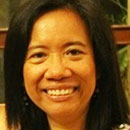When a Lucban Municipal Police Station posted on Facebook advising the public to“love women” and in the same breath advised girls “not to wear excessively short clothes and when harassed, come to us for help,” 19-year old Frankie Pangilinan was irate enough to tweet back in protest.
Her tweet compelled Ben Tulfo @bitagbentulfo to reply, “Hija@kakiep83 , a rapist or a juvenile sex offender's desire to commit a crime will always be there. All they need is an opportunity when to commit the crime. Sexy ladies, be careful with the way you dress up! You are inviting the beast.”
Pangilinan counter-tweeted:“Rape culture is real…The way anyone dresses should not be deemed as 'opportunity' to sexually assault them ever. Calling me hija will not belittle my point.”
When one of her Twitter followers wrote back to say, “id (sic) like to sign up for the hija label if that is what ben tulfo’s calling girls who fight for their rights as human beings,” the #Hija movement was born.
“Hija/Hijo” talks down to young people whose opinions do not matter much, a clear mechanism of inter-generational tensions, intentional or not. A nineteen year old woman with powerful connections and media mileage standing up to the newscasterTulfo known for machismo, bombastic reporting, and abrasive interviewing style was no small deal.
The bigger deal however is this latest #Hija meets #MeToo Philippine version movement challenging the worsening normalization of rape culture, objectification of women’s bodies, and victim blaming.
When Kim Cruz, one of the influencers of Cookies by the Bucket, a popular chain, revealed their male bosses would share contact numbers and addresses of influencers they “want to bang,” internet trolls went on hyper-speed. Cruz and Pangilinan then received hate posts, including rape threats, prompting Senator Panglinan to step in.
The #Hija movement connects with broader trends currently happening in the Philippines. The normalization of misogyny and sexism has reached new heights since President Duterte became our Top Executive and Commander-in-Chief in 2016. Thus, many Twitter enthusiasts of #Hijaalso use #JunkTerrorBill.
The President’s normalization of rape culture has given other men the license to degrade women. His remarks trample our national laws against sexual harassment rape, domestic and other forms of violence against women, which earlier Filipino feminists worked hard to institutionalize.
Duterte’s blatant display of power with impunity is only possible because of a receptive national audience. Since the 1970s rise of “bomba movies” to the popular tabloids and magazines promoting women’s degradation and sexualization, our society has become immune to the glorification of violence and daily harassment. In the process, we resort to blaming the victim.
When we attribute blame to someone, we acknowledge the intentionality of the action. We hold someone responsible for this act because the person freely chose the behavior to result in the outcomes, intended or unintended. If victim blaming fails the test of basic logic, why is this cognitive error still so common?
In my analysis, the dangerous combination of “just world” beliefs, fatalism and “better safe than sorry” attitude leads to victim blaming. Victim blaming based on the flawed cognitive error that since perpetrators of violence are not in full control of their actions, victims are or should be in control.
Blaming the victim tendency is strong in individualistic, fatalistic, and religious (read Judeo-Christian/Catholic) cultures where “Just World” beliefs are common.
Our “just world” beliefs tend to straddle two strands of thought.
One is the “justified” thinking. We say,“people get the life they deserve.” “They must have done something in this life [for Hindus and Buddhists, including previous lives]to cause bad things to happen to them.”
Second is our fatalism. Fatalistic thinking that “it was bound to happen,” “meant to be,” “sometimes bad things happen to good people.”
Moreover, since Filipino parents, especially mothers, have accepted or resigned to the fact that our streets and public places are dangerous, poorly policed sites of crime, they resort to “you better be safe than sorry” attitude.
We tell our children to avoid danger, placing the onus on them and ourselves to look after our own safety. This way, we feel some control over things we cannot control.
The “just world” belief then serves as a safety valve to assuage our guilt or share of blame when bad things do happen. “Better be safe than sorry” attitude gives us some control over our environments and security that have deteriorated.
We ask our daughters to anticipate, to foresee uncontrollable threats, to protect ourselves from danger, to be hyper-vigilant. They deserve blame if they are not vigilant, not careful, or did not do enough to avoid the situation in the first place.
Mothers, fathers, women, men, and people of diverse genders buy into this idea. Women must dress modestly. They are “asking for it” by “flirting” or “teasing” men with their dress.
This idea that sexual assault or harassment happens because of the way women dress, walk, look, behave, or act towards men remains so pervasive and ingrained in people’s thinking. This thinking reflects Filipinos’ persistent beliefs about male and female privilege, male and female sexuality, and gender stereotypes and binaries: “boys will be boys” “girls will be girls.”
Cognitive errors and attribution problems thrive in cultures that do not promote critical thinking in schools, within our families, workplaces, media, political systems, everywhere. Education is not entirely at fault. Our belief systems, sexism, misogyny, gender bias, gender discrimination, and stereotyping practices are part of the problem.
We need systems to change. We need critical thinking skills, now more than ever in our critical historical moment.



